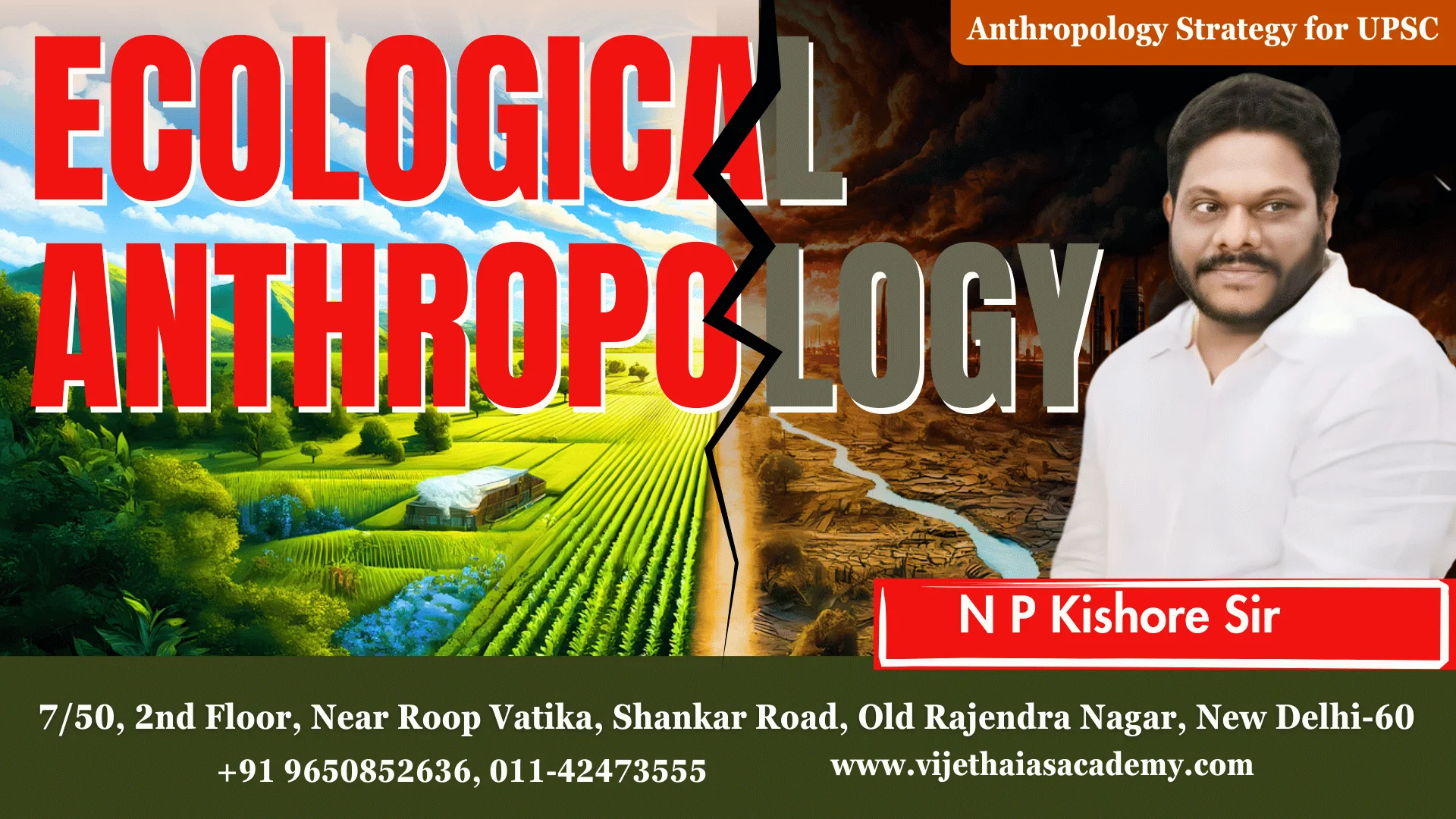
Ecological Anthropology: A Crucial Component of the UPSC Anthropology Optional
Ecological anthropology is a fascinating and vital field that examines the complex relationships between humans and their environment. For UPSC aspirants who have chosen anthropology as their optional subject, mastering ecological anthropology is essential. It not only broadens your understanding of human societies but also enhances your analytical abilities, crucial for the exam. Leveraging resources like Vijetha IAS Academy and the expertise of Kishore sir can significantly aid your preparation in this nuanced subject.
Understanding Ecological Anthropology
Ecological anthropology, also known as environmental anthropology, explores how human cultures interact with their environment. It investigates how environmental factors influence human behavior and societal development, and conversely, how human activities impact the environment. This field bridges the gap between natural and social sciences, providing a holistic view of human-environment dynamics.
Key Concepts in Ecological Anthropology
-
Cultural Ecology: This subfield studies how cultural beliefs and practices help human populations adapt to their environments. Pioneered by Julian Steward, cultural ecology focuses on how cultural practices, technologies, and social structures enable societies to thrive in specific ecological settings.
-
Political Ecology: This approach examines how political, economic, and social factors influence environmental issues and policies. It critiques the power dynamics and inequalities that shape human interactions with the environment, emphasizing the role of political and economic structures in environmental degradation and conservation.
-
Ethnoecology: This branch looks at the indigenous knowledge systems and practices related to the environment. Ethnoecologists study how traditional ecological knowledge (TEK) helps in sustainable resource management and biodiversity conservation.
-
Human Behavioral Ecology: This perspective applies evolutionary theory to understand how human behaviors are shaped by ecological and social pressures. It investigates how survival and reproductive strategies are influenced by environmental conditions.
The Importance of Ecological Anthropology
Understanding ecological anthropology is crucial for addressing contemporary global challenges such as climate change, biodiversity loss, and sustainable development. It offers insights into sustainable living practices and informs policies aimed at environmental conservation and equitable resource distribution.
Ecological Anthropology in the UPSC Syllabus
For UPSC aspirants, ecological anthropology is an integral part of the anthropology optional syllabus. It intersects with other key areas such as cultural anthropology, archaeology, and biological anthropology, providing a comprehensive understanding of human societies.
Key Topics to Focus On
-
Human Adaptation to Environment: Study how different human populations adapt to various environmental conditions, including extreme climates like deserts, arctic regions, and rainforests.
-
Subsistence Strategies: Examine the different ways human societies obtain their food, including hunting and gathering, agriculture, pastoralism, and industrial food production.
-
Ecological Approaches to Study of Culture: Understand the methodologies and theories used in ecological anthropology to study cultural practices and their environmental impacts.
-
Case Studies: Analyze specific case studies that highlight the interaction between human societies and their environment. These can include traditional agricultural practices, water management systems, and forest conservation efforts by indigenous communities.
-
Contemporary Environmental Issues: Investigate how ecological anthropology addresses modern environmental issues such as climate change, deforestation, and urbanization.
Relevance of Ecological Anthropology for UPSC Aspirants
Enhances Analytical Skills
Ecological anthropology requires a multidisciplinary approach, combining insights from anthropology, ecology, geography, and political science. This interdisciplinary perspective enhances your analytical skills, enabling you to critically evaluate complex issues and develop holistic solutions.
Informs Essay Writing
A deep understanding of ecological anthropology can significantly improve your essay writing. You can draw from a wide range of examples and case studies to substantiate your arguments, making your essays more insightful and compelling.
Broadens Knowledge Base
Ecological anthropology provides a broad knowledge base that is beneficial for the general studies papers. Topics such as sustainable development, environmental policies, and cultural practices related to resource management are frequently covered in the UPSC exam.
Strengthens Interview Preparation
In the interview stage, demonstrating a nuanced understanding of human-environment interactions can set you apart from other candidates. It shows that you are well-informed about contemporary global challenges and capable of contributing to policy-making processes.
Leveraging Vijetha IAS Academy for Ecological Anthropology
Given the complexity of ecological anthropology, specialized coaching can be immensely beneficial. Vijetha IAS Academy offers tailored courses for UPSC aspirants, focusing on key areas of the syllabus under the expert guidance of Kishore sir.
Benefits of Enrolling in Vijetha IAS Academy
- Expert Guidance: Learn from experienced educators like Kishore sir, who provide in-depth knowledge and practical insights into ecological anthropology.
- Structured Curriculum: Follow a well-organized syllabus that covers all essential topics systematically, ensuring comprehensive preparation.
- Interactive Learning: Engage in discussions, doubt-clearing sessions, and interactive classes that enhance understanding and retention.
- Regular Assessments: Benefit from regular mock tests and practice papers that evaluate your progress and help identify areas for improvement.
Conclusion
Ecological anthropology is a vital component of the UPSC anthropology optional syllabus, offering profound insights into the complex relationships between human societies and their environment. For UPSC aspirants, mastering this field is crucial for both the anthropology paper and the overall exam preparation.
Enrolling in specialized courses like those offered by Vijetha IAS Academy and leveraging the expertise of Kishore sir can significantly enhance your understanding and preparation. By integrating ecological anthropology into your study routine, you can approach the UPSC exam with confidence, equipped with a comprehensive understanding of the intricate dynamics that shape human-environment interactions.

